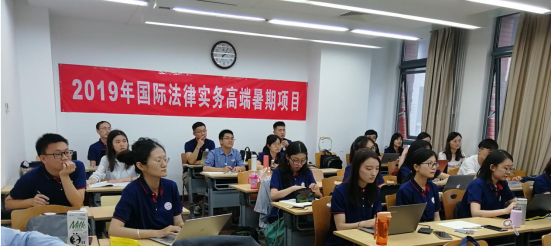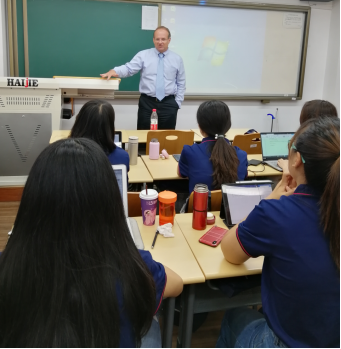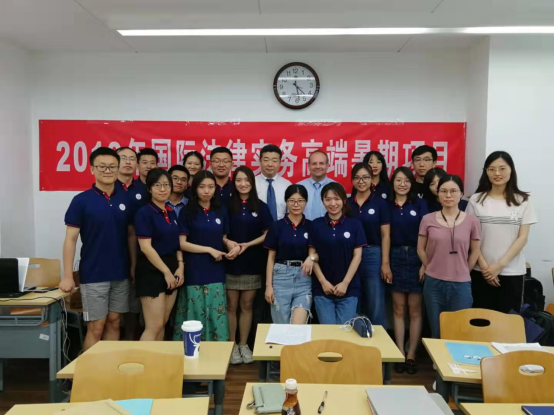The 2019 High-level Summer Program on International Legal PracticewasheldbySchool of Juris Master to strengthen the cultivation of interdisciplinary legal talent, further optimize the model for cultivating high-caliber talent, and to cultivate talentwith internationalvision. The Program, taking place from July 7 to 19 in 2019, covered classroom teaching, a series of special lectures, and practices, among others. 100% English was used in the class, attended predominantly by students of School of Juris Master enrolled in 2018 who had passedtheselection test for English proficiency.

Prof. LIU Zhihui, Deputy Dean oftheSchool of Juris Master, moderated and addressed the opening ceremony on the morning of July 7. Lawyer TAO Jingzhou, ManagingPartnerfor China Business of the US-based law firm Dechert, was the first to lecture. His lecture, themed“Solutions to Disputes Regarding the Belt & Road Initiative”, illustratesthe types of and solutions to disputes regarding the Belt & Road Initiative, practices in the selection of international seat of arbitration, the background and history of the Belt & Road Initiative, and the legal quagmire in the development of international investment. On the afternoon, Prof. Alexander Morawa withtheSchool of Law of American University in the United States gave a lecture on“Immigration and Emigration: From the Perspective of the International Law and the US Immigration Law”. The lecture distinguished among several notions related to immigration & emigration, and illustrated the development history of the US Immigration Law.

Prof. Spencer Rand with Beasley School of Law of the US-based Temple University lectured the course on“Meeting, Consultation, and Negotiation”. He impartedtheknowledge on litigation and non-litigation business primarily in three dimensions: meeting, consultation, and negotiation. This course was highly interactive as it was designed to impart know-how on practicesandintensify the communication skills with the client, potential customers, and the adversary. Prof. LIANG Cuining, a certified attorney based in New York State of the United States, lectured the course on“the Series of Lectures onLegalWriting in English”. Combining theoryexplanation and practicecomments, Prof. LIANG Cuining illustrated how toaccomplish legal writingin English. Prof. XU Jingde, a former chairman for Asian-Pacific Regionof Baker&McKenzieInternationalLawFirm, lectured the course on“Comparative Study of Regulations Concerning the Writing of Commercial ContractsinChina and Foreign Countries”, which made comparisons between commercial contracts of China and those of foreign countries in terms of the nature, purpose, content, and disputeresolutionof such contracts. Prof. Roberto Caso withtheSchool of Law of the Italia-based University of Trento lectured the course on“Comparative Copyright Law”. Prof. ZHANG Liying with CUPL lectured on the conclusion of international trade contracts, the role of bill of lading for marine transportation, the payment methodsbyletter of credit in theSpecial Subject on the International Trade Law.
During the practices,theSchool of Juris Master organized the students to pay a visit to the China International Economic and Trade Arbitration Commission (CIETAC), allowing them to learn aboutthe basic knowledgeof the Arbitration Law, the history and status-quo of CIETAC and to appreciate the competitive advantages of CIETAC in contrast to other arbitration bodies. In addition,theSchool of Juris Masteralsoorganized the opening of moot courts, in which 18 students were divided intotwogroups mooting a civil court and a criminal court,respectively. The civil group chose a case of dispute over gift contract,whilethe criminal group chose a case of juveniles being suspected of crime of robbery.
Thanks to the fortnight-long summer program,thestudents have gained a better understanding of different dimensions regarding international legal affairs. In addition, this program has also contributed to the cultivation of interdisciplinary legal talent of the school, playing a positive role in further optimizing the model forcultivatinghigh-caliber talent andincultivating talent on a more global basis.
